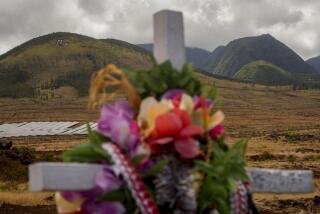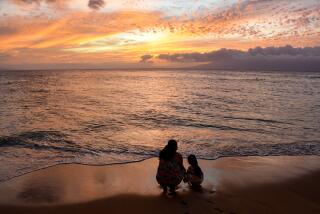Molokai, Hawaii: Island elders keep tradition alive in song
Kaunakakai, Hawaii — A fire that raged through Hotel Molokai’s Hula Shores restaurant last spring did not keep the kupuna — and their audience — from claiming their spots near the lapping sea and coconut palms. For more than a decade, at 4 p.m. Fridays, 10 to 30 kupuna (“elders” in Hawaiian) have gathered at the hotel to strum their ukuleles and sing the lost songs of their youth.
Half of the kupuna had their backs to the audience; instead of performing they sat around card tables sipping wine, laughing and enjoying themselves. A casual affair, free of grass skirts and mai tais with umbrellas, this Molokai tradition not only extends lives and builds community, but it also offers a glimpse of Hawaiian culture that most travelers don’t see.
Despite having 95 miles of stunning coastline, the only great barrier reef in Hawaii and world-class hikes, Molokai doesn’t go out of its way to lure tourists. There is one hotel and a couple of condos, a handful of places to eat. People come to immerse themselves in Hawaiian history and culture. As one local said, “Molokai is what Oahu was before Pan Am arrived.”
I learned of Na Kupuna O Molokai last spring, when a Maui friend said I had to experience this powerful event firsthand. On this particular Friday, about 100 people crowded into the outdoor bar area as 10 kupuna, led by Hawaiian music historian Lono, began to sing.
Thick folders stuffed with playlists fluttered in the breeze before each member as they sang traditional songs that evoked images of lost Hawaii. “[The] kingdom was overthrown over 100 years ago,” said Kim Markham, a local artist and kupuna hula dancer who joined the elders. “For a long time missionaries forbid the speaking of the Hawaiian language and playing music. Songs were lost.”
To keep alive the songs of Hawaii’s past, Hotel Molokai invited kupuna to sing and dance together on a regular basis, offering them free food and drink. Now these elders are known all over the islands.
“Everyone is proud of our kupuna,” Markham said.
Markham and a few other kupuna used their hands to tell the musicians’ stories about nature. “Hawaiian music has hidden meanings that speak of intangible things,” bandleader Lono explained afterward. A song may be about flowers or the sea, but the unstated meanings are the true stories passed down through generations.
For Hawaiians, this is challenging because one word may have 10 meanings — aloha, for example, means hello, goodbye, love and indicates a way of life, a philosophy — so translating traditional Hawaiian songs is interpretive and a creative act. Yet this can be frustrating, especially if the younger generation loses interest in Hawaiian music and culture.
Na Kupuna O Molokai is trying to change this. The kupuna come from many walks of life — professionals, homesteaders, priests and farmers — and offer various pronunciations of the lyrics and interpretations of each song. Kupuna from other islands often appear with their ukuleles, songs and even hula skills. They are always welcome to tell their version of the story, a gift that the elders hope to pass to the younger generation before the language and songs disappear.
Markham said the kupuna “practice to keep their brains active.”
“Playing ukulele, they must learn chords and anticipate change,” Markham said. “It is mental exercise and a physical challenge to get there.” Lono often arranges transportation for the elders. From the smiles on the faces of the audience members, it is clear the community appreciates the efforts.
As do the elders. The joy of singing the songs of Lena Machado, Israel Kamakawiwoole, Genoa Keawe and other Hawaiian songbirds and composers emanates from the performers. You’ll hear a burst of laughter and the unity of their voices rising above the waves and wind to create song. “The table is in constant change because of age and sickness,” Lono added. “[Kupuna] will spend the last days of their lives here with us, until they can no longer participate.”
Some cultures may hide the elderly, but Molokai’s kupuna are encouraged to appear in public to share the stories of their ancestors with anyone willing to listen. By bringing the aloha of their ancestors to the table, the legacy of Hawaii’s cherished vocal tradition lives on.
More to Read
Sign up for The Wild
We’ll help you find the best places to hike, bike and run, as well as the perfect silent spots for meditation and yoga.
You may occasionally receive promotional content from the Los Angeles Times.






